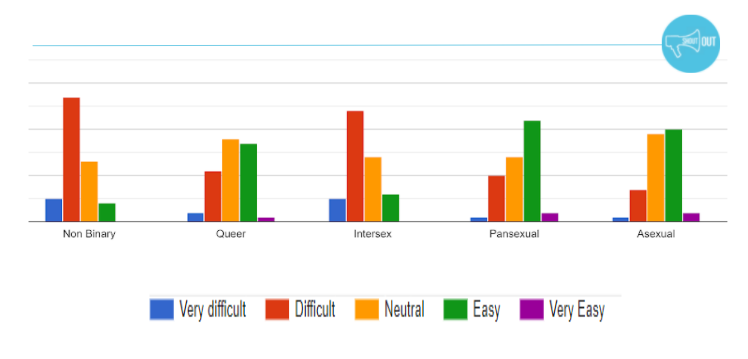Attitudes of Secondary School Students in Ireland towards Intersex Issues
/Last week we were delighted to present a small piece of research at the Intersex 2021 Conference held by Dublin City University. On a panel hosted by Ailbhe Smyth we discussed the findings from surveying ShoutOut volunteers about their experiences discussing Intersex issues in classrooms across Ireland.
The research was presented by Clara Barry; a ShoutOut volunteer and a board member of Intersex Ireland, and Bella FitzPatrick; CEO at ShoutOut
Firstly we wanted to clarify ShoutOut’s position around Intersex issues.
Not every Intersex person wants to be included under the LGBTQ+ umbrella
There are other human rights based approaches to advocating for Intersex rights which are not involved with LGBTQ+ rights
Intersex people can have intersecting identities
When discussing themes around bodily autonomy, the right to self declaration, and bioessentialist gender norms it is important to recognise the existence of Intersex people
Intersex marginalisation is perpretrated as part of a system of white supremacy and colonalisation.
The Irish curriculum does not address the existence of Intersex people and therefore our workshops may be the only opportunity to raise awareness
All of our material is written and/or reviewed by Intersex people
Image Description: Two flags against a blue sky, one is the rainbow pride flag with the ShoutOut logo in the middle, the other is the Intersex flag which is a purple circle on a yellow background
Our research looked into the experiences of ShoutOut volunteers when discussing the Intersex Community within the context of ShoutOut workshops.
We asked 49 volunteers about their experiences. The volunteers self-reported their awareness of Intersex issues as an average of 4.5 out of 10 before volunteering with ShoutOut. This rose to an average of 7.7 after volunteering with ShoutOut due to the training we provided.
Of all the identities we discuss in ShoutOut workshops, Intersex was reported to be one of the most difficult to communicate, similar to explaining non binary identities.
ShoutOut volunteers reported that the reaction from students when learning about Intersex issues ranged from curious, confused, disbelieving and disrespectful. We concluded that contributing factors are lack of teachers’ knowledge, lack of representation on the curriculum, misconceptions, and a lack of positive visibility.
Furthermore, we noted a severe lack of resources for teachers who want to learn more and a lack of guidance from the Department of Education in this regard.
“Our bodies are just another example that life is not so black and white. Much Beauty exists in the infinite shades of grey”
Want to learn more?
Follow
@IrelandIntersex
@IntersexMap
@DubTrans
@Pidgeon
Read
XOXY by Kimberly M. Zieselman
Sex Redefined in Nature
9 Young People on How They Found Out They Are Intersex in Teen Vogue
Our Blog on Intersex Allyship
Listen
Emily Quinn - The way we think about biological sex is wrong
Gonads - a podcast series by Radiolab





